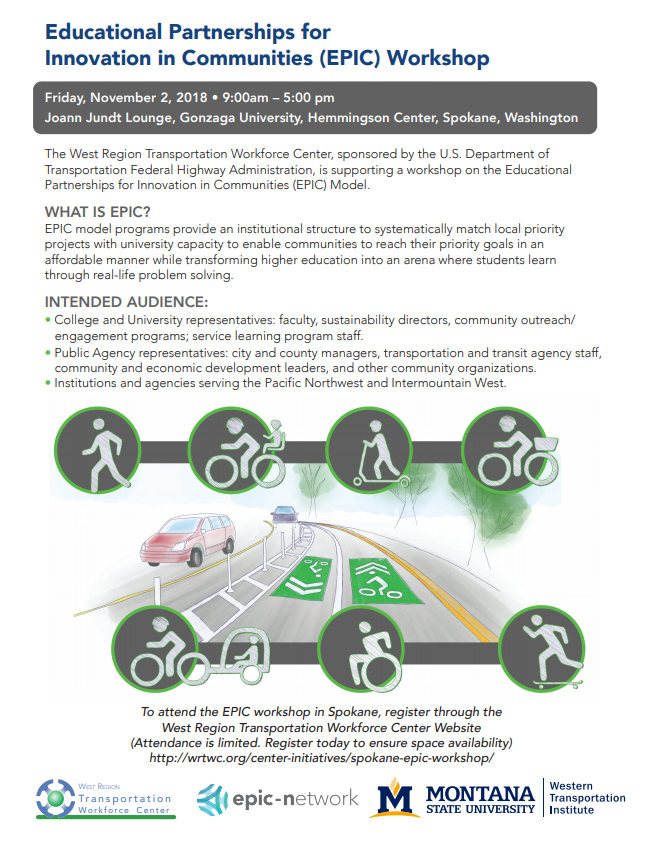|
|
|
|
 |
|
Hot Topic: University-Public Agency Partnerships: Another Invitation to Get Engaged!
|
|
University and Public Agency Representatives Invited to Workshop on Establishing Innovative Agency-University Partnerships
 The West Region Transportation Workforce Center will be hosting a November 2 workshop at Gonzaga University in Spokane, Washington to provide information on the Educational Partnerships for Innovation in Communities (EPIC) model - a proven, replicable, and adaptable model for building partnerships between universities and local governments and agencies to advance strategic goals while developing the next generation workforce. The West Region Transportation Workforce Center will be hosting a November 2 workshop at Gonzaga University in Spokane, Washington to provide information on the Educational Partnerships for Innovation in Communities (EPIC) model - a proven, replicable, and adaptable model for building partnerships between universities and local governments and agencies to advance strategic goals while developing the next generation workforce.
The WRTWC invites university faculty and other higher education representatives as well as transportation and other local government agency representatives to participate. The workshop is designed as an interactive forum to provide information, tools and guidance for new programs to get started, and an opportunity for networking and collaboration building. The model integrates project-based learning experiences into university coursework on a large scale through yearlong collaborations between education institutions and local agencies, enabling agency partners to reach their goals in an affordable manner while transforming higher education into an arena where students learn through real-life problem solving and develop valuable skills.
For more information and to register, click here.
Workshop Trainers
Date
: Friday, November 2, 2018
Time
: 9 am-5 pm
Location
: Joann Jundt Lounge, Hemmingson Center at Gonzaga University
Spokane, Washington
Cost
: There is no fee to register for the one-day workshop, but space is limited.
We hope to see some of you in Spokane!
|
|
Western States Forum
 The
Western States Rural Transportation Technology Implementers Forum
is not like any other meeting or conference. The annual conference facilitates high-quality exchange of technical information for engineering practitioners. Started in 2006, the Forum provides a unique opportunity for field engineers, maintenance personnel, and technicians to share ideas and discuss rural ITS implementation. The Forum encourages dynamic discussion at a technical level to promote transfer of solutions and knowledge across the ITS community. Over the years, topics have ranged from microwave communications to RWIS to complex software and data exchange with rural TMCs. The
Western States Rural Transportation Technology Implementers Forum
is not like any other meeting or conference. The annual conference facilitates high-quality exchange of technical information for engineering practitioners. Started in 2006, the Forum provides a unique opportunity for field engineers, maintenance personnel, and technicians to share ideas and discuss rural ITS implementation. The Forum encourages dynamic discussion at a technical level to promote transfer of solutions and knowledge across the ITS community. Over the years, topics have ranged from microwave communications to RWIS to complex software and data exchange with rural TMCs.
The Forum helps to develop a skilled workforce and promotes ITS deployment. It provides information about emerging technologies to implementers, encourages new deployments, and helps agencies make informed decisions. The Forum helps agencies deploy and maintain effective systems by providing direct technical assistance to implementers which enhances the overall transportation system. At its core, the Forum is a multi-state network of colleagues who turn to each other for assistance with ITS projects and deployments.
To find out more about the program, visit our website.
|
|
Do you have a success story to share?
Let your peers know what has worked for you. You can now enter details about your workforce development successes online and we will showcase them on our website.
|
|
Upcoming Trainings & Events
|
|
Webinar: Scalable Risk Assessment for Bicyclists and Pedestrians
Date: October 10, 2018
Time: 11:00 am to 12:30 pm MT/1:00 pm to 2:30 pm ET
Cost: Free
Organization: Pedestrian and Bicycle Information Center (PBIC)
The FHWA Office of Safety will soon publish the Guide for Scalable Risk Assessment Methods for Pedestrians and Bicyclists (Report No. FHWA-SA-18-032), which details risk assessment and exposure estimation approaches at several different geographic scales. This guide outlines eight sequential steps to develop risk values, and describes the scope and nature of each step, including any guiding principles. Practitioners can use these scalable risk assessment methods, as well as an online spreadsheet tool, to evaluate pedestrian and bicyclist risk at different geographic scales to inform program and project funding decisions.
This webinar will provide an overview of these scalable risk assessment methods for pedestrians and bicyclists. Exposure is an integral element of risk, and the webinar will outline and describe three basic exposure estimation approaches for pedestrians and bicyclists: 1) site counts; 2) travel demand estimation models (several different types); and, 3) travel surveys. Panelists from the Texas Transportation Institute (TTI), University of Michigan Transportation Research Institute (UMTRI) and the Federal Highway Administration (FHWA) will share the new guidance and spend time responding to discussion questions from attendees.
This webinar is supported by the Federal Highway Administration's Office of Safety through a national program to provide training and technical assistance to the FHWA-designated Pedestrian and Bicyclist Safety Focus Cities and States.
For more information about this training, click
here
.
|
Webinar: Proactively Addressing Crash Risk with Systemic Safety Analysis
Date: October 11, 2018
Time: 11:00 am to 12:30 pm MT/1:00 pm to 2:30 pm ET
Cost: Free
Organization: Pedestrian and Bicycle Information Center (PBIC)
Analyzing safety risk for pedestrians and bicyclists has conventionally focused on crashes alone. But agencies interested in being more proactive about minimizing or eliminating risk are employing a systemic approach that takes a broader view of risk evaluation across an entire roadway system. A systemic approach acknowledges that crashes alone are not always sufficient to determine risk potential and appropriate countermeasures. Such an approach focuses on identifying a variety of roadway and environmental characteristics associated with crash risk and proactively implementing system wide safety improvements typically using lower cost engineering treatments.
This webinar will explore the fundamentals of a systemic approach to minimizing safety risk for pedestrians and bicyclists and highlight case studies from the City of Seattle and other agencies.
For more information about this training, click
here
.
|
Webinar: Addressing Bicycle-Vehicle Conflicts with Alternate Signal Control Strategies
Date: October 16, 2018
Time: 11:00 am to 12:00 pm MT/1:00 pm to 2:00 pm ET
Cost: Free
Organization: National Institute for Transportation and Communities (NITC)
There is nationwide interest in supporting sustainable and active transportation modes such as bicycling and walking due to the many benefits associated with them, including reduced congestion, lower emissions and improved health. Although the number of bicyclists is increasing, safety remains a top concern. In urban areas, a common crash type involving bicycles at intersections is the "right hook" where a right-turning vehicle collides with a through bicyclist. While geometric treatments and pavement markings have been studied, there is a lack of research on signal timing treatments to address right-hook bicycle-vehicle conflicts.
Addressing Bicycle-Vehicle Conflicts with Alternate Signal Control Strategies, published in April 2018, is the first study to explore bicycle signal control strategies for addressing bicycle-vehicle conflicts. This study analyzed the operational impacts of traditional concurrent phasing, leading bike intervals (LBI), split leading bike intervals, and exclusive bike phasing in a microsimulation environment, and explored the safety impacts of traditional concurrent phasing, leading bike intervals, split leading bike intervals, and mixing zones using video-based conflict analysis. The microsimulation analysis revealed increased delays due to LBI, split LBI and exclusive bike phasing for the affected motor vehicle phases compared to traditional concurrent phasing. Using post-encroachment time (PET), a surrogate safety measure, conflicts between turning vehicles and bicyclists were investigated. While the split LBI treatment was useful in mitigating conflicts during the lead interval, the risk for bicyclists is shifted to the stale green portion of the phase. No correlations were found between the frequency of conflicts and elapsed time since green. With the mixing zone treatment, significant confusion was exhibited by both cyclists and drivers, with respect to the correct action to be taken.
Observation also revealed that a significant percentage of the vehicles merged into the mixing zone at the very last second, thus adding to the confusion. This study provides broad-based recommendations on the appropriate treatment to be implemented to reduce right-hook conflicts.
For more information or to register, click
here
.
Link: https://nitc.trec.pdx.edu/events/professional-development/webinar-10162018
|
 Conference: 2nd National Summit on Rural Road Safety Conference: 2nd National Summit on Rural Road Safety
Date: December 4-6, 2018
Location: Savannah, GA
Organization: National Center for Rural Road Safety, National Association of County Engineers (NACE)
Rural communities provide food, energy, resources and much more to keep America running. In 2016, attendees at the National Working Summit on Transportation in Rural America helped define the future for "Moving Rural America" by articulating the key transportation safety issues facing rural areas, culminating in a call to action of "On the Road to Zero, We Cannot Ignore Rural."
The 2nd summit will continue to move the rural conversation forward and will focus more intently on safety solutions and "Bridging the Gap."
 How do we create awareness and a unified voice for rural areas? How do we create awareness and a unified voice for rural areas?- What rural-specific solutions exist and how do you implement them within rural constraints?
- How do we look at rural safety without peering through an "urban lens?"
- More importantly, how do we shift rural safety culture to get us to zero?
Join this conversation in Savannah, Georgia in December 2018. We need your perspective and expertise to successfully articulate rural transportation safety needs and solutions.
For more information or to register, click
here
.
Link:
http://www.cvent.com/events/national-summit-on-rural-road-safety/event-summary-a2af3dedc4894794a3e16264520f5446.aspx
|
Please check out our website for the most up-to-date news and activities.
Is your organization hosting an event or opportunity you would like to share with the regional network? Please contact us and we will be happy to help you distribute the information.
|
|
|
|
|